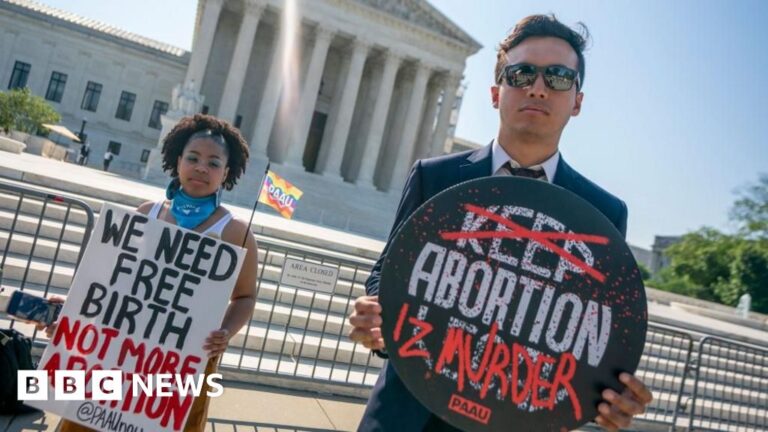Image source, Getty Images
The U.S. Supreme Court unanimously rejected a move to restrict access to the abortion drug mifepristone.
The decision, which comes two years after the court struck down a nationwide abortion guarantee, was welcomed by pro-abortion activists.
The justices ruled that the plaintiffs, a group of anti-abortion doctors and activists, had no legal standing to bring the lawsuit.
But they left room for other attempts to restrict access to the drug.
- author, Holly Honderich
- role, BBC News, Washington
-
Mifepristone is one of two drugs used in medical abortion, currently the most common form of abortion in the United States.
The plaintiffs, known as the Hippocratic Medical Alliance, had argued that the drug’s approval by the U.S. Food and Drug Administration (FDA) should be revoked.
But during arguments on the case in March, several of the court’s nine justices expressed skepticism about whether any of the plaintiffs were harmed by the availability of mifepristone, which they needed to have a legal basis to sue.
“Plaintiffs raise serious legal, moral, and philosophical challenges to elective abortion and FDA deregulation,” Justice Brett Kavanaugh wrote for the court, “but they have failed to demonstrate actual injury.”
“Plaintiffs’ desire to make it harder for others to obtain drugs does not give rise to standing to sue,” he wrote.
The Supreme Court overturned Roe v. Wade in June 2022, effectively stripping federal abortion rights. Since then, 21 states have moved to restrict abortion access earlier in pregnancy than the standard, including 17 that ban abortions within six weeks.
Thursday’s ruling doesn’t affect those laws — medication abortions remain illegal in states that ban abortion — but the abortion pill has served as an effective workaround for bans, with thousands of doses being funneled through the mail into states with stricter restrictions.
Pro-abortion activists were encouraged that access to abortion pills was preserved, but warned that the Supreme Court’s decision was a limited victory.
At least three states – Missouri, Kansas and Idaho – have also challenged the FDA’s approval of the drug in court, and the Supreme Court’s decision on Thursday does not preclude such future challenges.
“This ruling is not a victory for abortion, it simply maintains the status quo,” Nancy Northup, executive director of the pro-abortion Center for Reproductive Rights, said in a statement.
“The attacks on the abortion pill don’t stop here. The anti-abortion movement recognizes how important the abortion pill is in a post-Roe world.”
President Joe Biden echoed those comments in a statement, saying the ruling “does not change the fact that the fight for reproductive freedom continues.”
“For women across America, this crisis couldn’t be greater,” he said.
Anti-abortion groups criticized the decision, but they also indicated the fight would continue.
“This is a sad day for all who care about women’s health and the lives of unborn children,” said Katie Daniel, state policy director for Susan B. Anthony Pro-Life America, “but the fight to stop the mail-order sale of dangerous abortion pills is not over.”
Abortion is expected to be a key issue on the ballot this fall.
Presumed Republican presidential nominee Donald Trump has in recent months urged party members to compromise, arguing that a strict ban would be politically costly.
Addressing House Republicans on Thursday morning, Trump appeared to argue for an exception to the anti-abortion law, saying, “Like Ronald Reagan, we need three choices: the life of the mother, rape and incest.”
He added: “But you have to follow your heart.”
The two-drug combination was approved by the FDA in 2000 for use up to 10 weeks of pregnancy. Patients are first given mifepristone to induce the abortion, then misoprostol to empty the uterus.
The FDA has made the drug more accessible since 2016, allowing doctors to meet with patients online and write prescriptions by mail, but it is these recent approvals that are at issue in the lawsuit.
According to the Guttmacher Institute, which supports abortion access, nearly two-thirds of abortions in the United States are currently medication abortions.
More than one million abortions were performed in the United States last year, the highest number in a decade, according to the institute.
Throughout 20 years of use, the FDA, the American College of Obstetricians and Gynecologists (ACOG), and other mainstream medical organizations have maintained that both mifepristone and misoprostol are safe for women to use.
US studies have found that medical abortions are around 95% effective in ending pregnancies, with less than 1% needing further medical follow-up.

